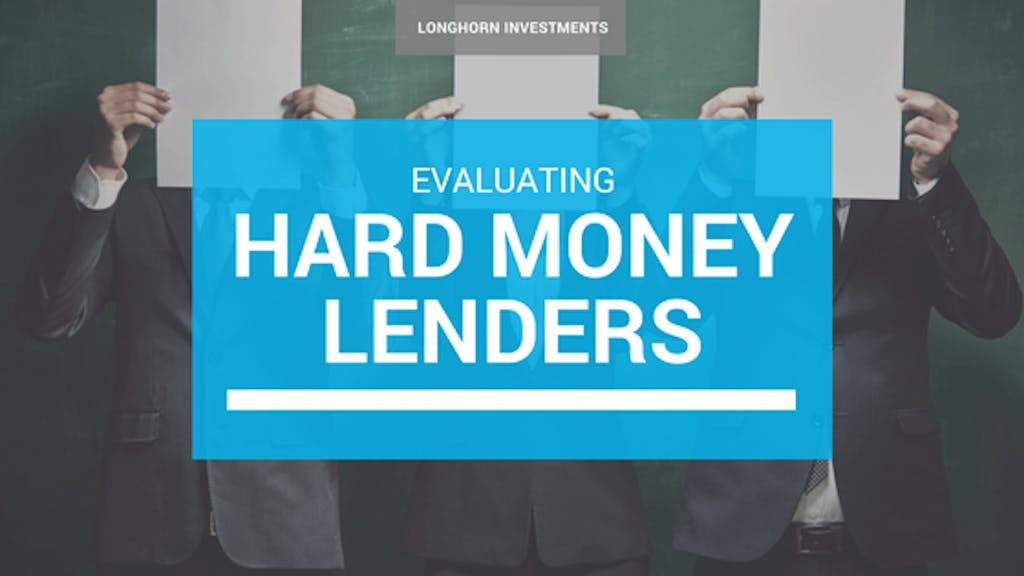Evaluating Hard Money Lenders – Are You Asking the Right Questions?

Hard money lenders can be a great option for quick and easy access to capital for any renovation project. With all of the options available to investors, it is important to know how to evaluate different lenders. Building a great relationship with the right hard money lender on the front end can lead to more profitable projects and help you avoid costly delays. Below are a few criteria to consider when selecting a hard money lender.
Is there market credibility?
Experience counts. You’ll want to make sure you’re working with an experienced lender with a solid reputation. Working closely with a lender you trust can be invaluable to your success. There’s no magic number when it comes to the length of time a lender has been in business, but evaluating the volume of loans originated can be a good gauge. Asking for referrals from existing borrowers is also a great way to garner information.
What is their source of capital?
There are essentially three ways hard money lenders fund deals. It is important to understand each one and determine which one works best for you.
Direct Lender – A direct lender uses pooled raised capital and/or debt to fund loans. This is the most stable type of lender, and they often have the ability to handle large volume. The risk of a direct lender not funding a loan is very low. They are also more flexible with making exceptions to underwriting guidelines and customizing the structure of a deal.
Broker – A broker will outsource the deal to a direct lender for underwriting and eventual funding. Brokers often work with multiple lenders so they have the ability to handle many types of borrowers. Since they do not control the process, a borrower is ultimately at the mercy of the direct lender’s timeline. Brokers are also typically more expensive as they add on fees in addition to what the direct lender would normally charge.
Syndicators – A syndicator will be presented with a deal and then raise capital from individuals in order to provide funding. Funds are not available immediately and this presents a significant risk for the borrower. If a funding source is not available, the borrower may be forced to delay closing or lose the deal altogether. Syndicators may offer lower rates, but can cause transactional delays as they commonly raise needed capital after the deal is underwritten.
What is their draw process?
Lenders do not typically disburse the entire amount of renovation funds at the time of closing. “Draws,” or releases of portions of the loan proceeds, usually occur upon completion of a pre-designated stage (flooring installation, paint completed, kitchen completed.) or periodically (once a month for a specified number of months followed by a “final draw”).
It’s best to work with a lender with a quick draw process in the event you run into any emergencies with your property and you need funds quickly to take care of them. Also verify that the lender:
- does not hold back a portion of escrowed renovation funds until payoff of the loan
- has competitive pricing on draw inspections
- has a quick turn-around time
- sets aside your rehab funds so that they are always available for reimbursement and not used in funding other deals
What are the terms?
Be sure you understand all terms of the agreement before signing on the bottom line.
Typical terms to clarify:
- Rate – What is the interest rate? What is the term? Is there an option to extend and what is the cost? Most hard money lenders offer terms between six and twelve months with interest only payments.
- Points – (Remember one point is one percent of the loan amount.) Are there origination fees and, if so, how much? Are they all due at closing or can some be paid at pay-off? Lenders typically charge between two and five points per transaction.
- Advance Rate – Is the lender a loan-to-cost (LTC) or after repair value (ARV) lender? What is the maximum LTC or ARV? What is your down-payment or equity contribution requirement? Some lenders will lend 100% of the cost, but others require you to ante up a down payment so you have less chance of walking away from the deal if things go wrong.
- Additional Fees – What are the processing, underwriting, or administrative fees? Many lenders leave this out of a quote, but neglecting to understand these fees can lead to thousands of dollars in surprise costs at the closing table.
Are you getting a second opinion?
A quality lender will be able to provide insights into your deal. Their experience with different borrowers, areas, and scenarios should be able to provide valuable feedback for your project.
A few questions to talk through:
- Do the numbers make sense? Can you provide a breakdown?
- Is the rehab estimate sufficient for the project and the exit strategy?
- Can you provide feedback around the area based on other projects you are lending on?
- Can adjustments be made to help the borrower be more profitable?
How are their loans performing
Make sure and ask about the lender’s process if you determine you need more time to pay them off. Ensure you are working with a lender that is interested in your success as a real estate investor, not just interested in taking back your property. Lenders that wholesale or renovate properties themselves may end up being more of a competitor than a valuable resource as well.
Building a relationship with a solid hard money lender can pay off in many ways, but choosing the wrong lender can be costly. Remember, the cheapest lender is not always the best one for your situation. Protect your investment and your profits by getting answers to the questions above before you choose a lender.
—————————————————————————————————————————————–
ABOUT LONGHORN INVESTMENTS
Longhorn III Investments, LLC is a direct private lender offering short term acquisition and renovation capital to real estate investors for both residential and commercial assets. We operate in major metropolitan areas throughout Texas, Missouri, Indiana, and North Carolina. Highlights of our loan program include:
– Up to 70% of ARV (after repair value)
– Finance up to 100% of cost
– Close in 3 – 5 business days
– No income requirements
– Streamlined, simple approval process
– No pre-payment penalty
Longhorn was formed in 2008 and has funded over 1,700 loans since inception. Our complementary businesses include a title company and real estate law practice operating out of our corporate office. Our wealth of experience puts us in the unique position of being able to help investors through all aspects of each transaction.


